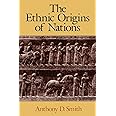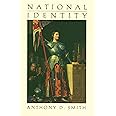Buy new:
-45% $38.49$38.49
Save with Used - Good
$17.99$17.99
Ships from: Amazon Sold by: BOOKS and More

Download the free Kindle app and start reading Kindle books instantly on your smartphone, tablet, or computer - no Kindle device required.
Read instantly on your browser with Kindle for Web.
Using your mobile phone camera - scan the code below and download the Kindle app.

OK
Ethnic Origins of Nations Reprint Edition
Purchase options and add-ons
- ISBN-100631161694
- ISBN-13978-0631161691
- EditionReprint
- PublisherJohn Wiley & Sons
- Publication dateJanuary 13, 2009
- LanguageEnglish
- Dimensions6 x 0.75 x 9 inches
- Print length312 pages
Frequently bought together

Customers who viewed this item also viewed
Editorial Reviews
Review
"Unquestionably an important contribution to the literature on nationalism ... this is a thoughtful, insightful investigation into the roots and strengths of ethnonational identity. ... I recommend it unhesitatingly to all students of nationalism." Walker Connor, Trinity College, Hartford
A well-researched, perceptive study of an important subject. It discusses comprehensively ethnic communities in pre-modern eras and ethnic and nations in modern ones. In addition to being based on solid facts, it is methodologically sound and conceptually provocative ... no political scientist, historian or sociologist can do without it." A. Jacob M. Landau, The Hebrew University of Jerusalem
"Smith's depth of learning is awe-inspiring, and this work deserves a prominent place wherever nationalism is discussed." Michael Levin, Ethnic and Racial Studies
From the Inside Flap
From the Back Cover
About the Author
Anthony David Stephen Smith was a British historical sociologist who, at the time of his death, was Professor Emeritus of Nationalism and Ethnicity at the London School of Economics. He is considered one of the founders of the interdisciplinary field of nationalism studies.
Product details
- Publisher : John Wiley & Sons; Reprint edition (January 13, 2009)
- Language : English
- Paperback : 312 pages
- ISBN-10 : 0631161694
- ISBN-13 : 978-0631161691
- Item Weight : 1.12 pounds
- Dimensions : 6 x 0.75 x 9 inches
- Best Sellers Rank: #1,847,098 in Books (See Top 100 in Books)
- #963 in Nationalism (Books)
- #2,754 in General Anthropology
- #8,035 in Cultural Anthropology (Books)
- Customer Reviews:
About the author

Discover more of the author’s books, see similar authors, read author blogs and more
Customer reviews
Customer Reviews, including Product Star Ratings help customers to learn more about the product and decide whether it is the right product for them.
To calculate the overall star rating and percentage breakdown by star, we don’t use a simple average. Instead, our system considers things like how recent a review is and if the reviewer bought the item on Amazon. It also analyzed reviews to verify trustworthiness.
Learn more how customers reviews work on Amazon-
Top reviews
Top reviews from the United States
There was a problem filtering reviews right now. Please try again later.
Smith positions himself in the crossfire between between two competing views in the literature on nationalism. On the one hand, there are the ‘modernists,’ who conceive of the nation instrumentally, as a contingent entity with its roots in the 18th century. On the other hand, there are the ‘primordialists’ who argue that nations are long-standing, naturally existing entities, and that the modern-day nation is an expression of this fact. Smith’s own argument attempts to achieve a middle ground between the two camps, although it often appears closer to that of the primordialists. On this point, Smith must be commended for avoiding the sociobiological and demographic pitfalls that have typically plagued such treatments of nationalism. Smith focuses on one particular element of ethnic consciousness, which he finds in the “myths, memories, values and the symbols” characteristic of certain historical configurations of populations (15). Curiously, Smith’s most explicit formulation of what his core concept of ethnicity entails comes nearly 100 pages into the book. It is worth quoting at length:
The approach adopted here defines ethnie as clusters of the population with similar perceptions and sentiments generated by, and encoded in, specific beliefs, values and practices. Here the demographic element is important, but secondary. For ethnie are viewed as consisting in: 1) symbolic, cognitive and normative elements common to a unit of population; 2) practices and mores that bind them together over generations, and; 3) sentiments and attitudes that are held in common and which differentiate them from other populations. (97)
Smith’s ethnie is particularly useful for investigating a very specific form of ethno-religious community, but one that must be counted as a rare example in recorded history. For most scholars of nationalism, as well as those concerned with matters of ethnicity, Smith’s definition will appear deficient on at least two counts. First, Smith gives short shrift to the role of language, and in particular to the role of living, colloquial languages in the formation of national and ethnic groups. Second, the role of societal organization is only tangentially recognized in his account. Smith contends that language is often irrelevant or divisive in the study of ethnicity (1986:27). If it is, in fact, divisive as Smith contends, then it would seem that language would be particularly useful in helping to identify the division between two ethnicities. If it is irrelevant, we must wonder about those communities where multilingualism is the basis of an ethnic consciousness, as it is among Colombia’s Vaupés.
Smith’s focus on the ethnie is part of a larger argument about ethno-symbolism and collective cultural identity. Myths, memories, values, symbols, and traditions become powerful elements in the fate of an ethnic community and are central to his analysis of ethnicity. However, this approach leaves untouched questions of the political, and this reviewer wonders whether it is possible to treat topics such as nationalism and ethnicity while ignoring the political elements that both of these concepts play in the formation of national identity. This points to one potential criticism of Smith: the narrow focus on cultural elements of nations and nationalism remains insufficient if we ignore the processes through which nations come to be recognized as such by others. In fairness to Smith, we should note that the ethnie is not necessarily a political entity – proving that a community has pre-modern roots and its culture has maintained a certain degree of continuity are and have been important objectives for political elites.
Smith’s ethno-symbolist approach tends to conflate nation and state. Although Smith recognizes that nation and state are not necessarily isomorphic (1986:138), it is the failure to address certain issues related to the spread of a common cultural element among the ethnie which he examines that poses the greatest threat to his theory of nationalism. Those in the so called ‘modernist’ camp, in particular Ernest Gellner, directly address the issue of the spread of a ‘mass’ national culture beyond a small elite. Gellner writes:
In the characteristic agro-literate polity, the ruling class forms a small minority of the population, rigidly separate from the great majority of direct agricultural producers, or peasants below the horizontally stratified minority at the top, there is another world, that of the laterally separated petty communities of the lay members of the society . . . Even if the population of a given area starts from the same linguistic base line – which very often is not the case – a kind of culture drift soon engenders dialectal and other differences. [Gellner 1983: 10]
Because Smith does not deal with the spread of ‘mass’ culture, this allows him to claim that nations, in the form of ethnies, existed in the pre-modern era, while sidestepping an investigation into the extent to which a ‘public’ or ‘mass’ culture may have existed. But how does this play out in Smith’s account? Smith writes that:
The Catalans are undoubtedly a nation today, just as they were an ethnie in the pre-modern world. Not only do they inhabit their historic territory (more or less), they are now able to teach in their own language and fund a mass, public, standardized education system in Catalan and in Catalonia. [166]
Should we understand nations recover and re-establish themselves in different periods, or do they remain in the nation during periods of intense upheaval? What Smith does not mention is that between 1936 in 1975 it would have been very difficult to identify anything resembling the Catalan ethnie under the Franco regime. Further, if a nation’s members should enjoy ‘common legal rights and duties’ (166), do we class the Catalans as Catalonian or Spanish? The problem here seems to be one of scale. Do all Spanish citizens, who enjoy ‘common legal rights and duties’ constitute a nation? If so, are the ‘common legal rights and duties’ shared by the Catalans contingent on their membership in a larger nation? Are French Catalans, who by virtue of their French citizenship share a different set of ‘common legal rights and duties,’ to be considered members of the Catalan ethnie?
The distinction between nation and state is fundamental to account for cases like the Catalan. Smith’s inability to make such a distinction obscures how nations that lose their political autonomy may survive, as well as how such nations function under conditions of colonialism. Does an ethnie continue to exist if it’s culture, like that of the Catalans, is effectively made illegal and banned from the public sphere? Do we assume that the constituent elements of the ethnie continue to exist in the privacy of one’s kitchen or in ‘hidden-transcripts’? If Smith were to address the distinction between nation in state, the Catalan case – and many others – might be resolved is a case of a nation without a state.
Those with limited time to devote to Smith’s book should focus on the first chapter. It is here where Smith makes his theoretical contribution to the study of ethnicity and nationalism. It is also in this chapter that Smith demonstrates his firm command of the literature on nationalism. Smith is at his best here, providing cogent and balanced summaries of the main literature on nationalism.
Smith’s book is perhaps best considered as an example of how scholars take the existence of ethnic identity for granted, and impose ethnic classificatory schemes on to certain artifacts and evidence based upon the assumption that an ethnie - or whatever we may call it - existed in the past. The idea that the modern day nation-state appeared de novo is not something that even the most committed Gellnerian or Andersonian would assert. As the saying goes ‘there’s nothing new under the sun’: any successful national movement will necessarily make use of powerful and pre-existing ideological and material interests. Smith’s book forces scholars of ethnicity and nationalism to confront a critical question: to what extent do earlier histories, whether we conceive of them as ethnic or not, limit and shape the course of national movements in the modern era?
Smith creates a whole typology about ethnic groups. He claims that all ethnic groups (or, as he calls them, 'ethnies', from the French for 'ethnic community') have several key aspects, including a name, common myth of descent, shared history and culture, territory and a sense of solidarity. They also fit into two main categories: lateral ethnies, which are based on an aristocracy and clerisy and rule over an indefinite but often large area, and the vertical ethnies, based on a urban, priestly or artisan class which rule over a small but clearly marked area.
Smith discusses the development of nations in the context of the French Revolution, when the modern concept of citizenship entered the picture, and here his narrative lets up a bit. Devoting most of the book to ethnicity, when he comes to discussing the two main types of modern nations - territorial (or non-ethnic) and ethnic - he spends too much time on the latter and not enough on former. This is an important flaw, since he thereby almost dismisses those nations like the U.S. which do not have an ethnic foundation and thus do not fit his theory.
Nonetheless this book is useful for the sole but important purpose of reinforcing the link between many nations and their ethnic pasts.







